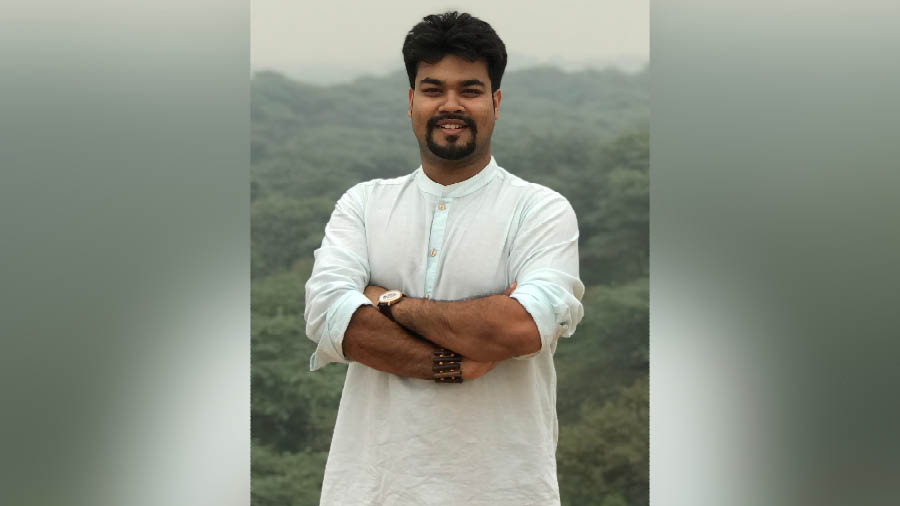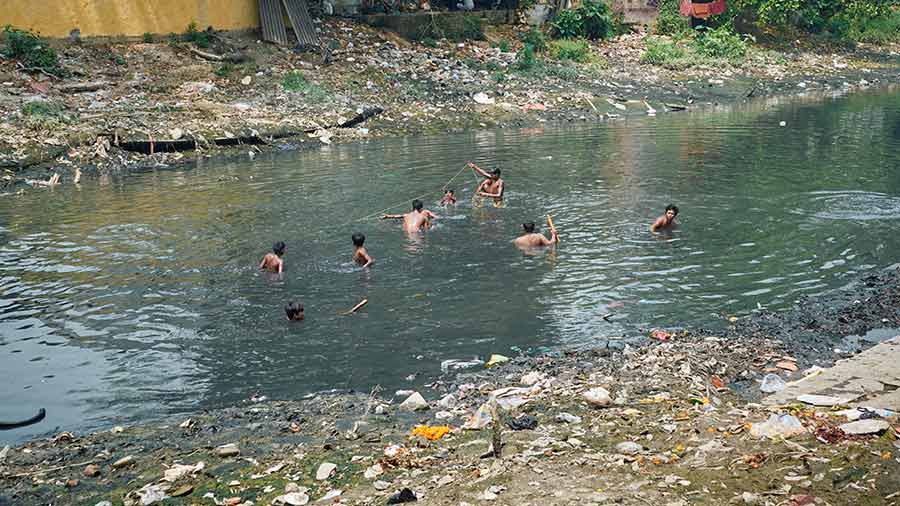How can one blend water and music? This one question has, in many ways, defined the life of 28-year-old Sukrit Sen, a heritage and disaster manager. Today, Sen leads the Kolkata chapter of the Living Waters Museum. He is also a part-time researcher at the International Centre for the Study of the Preservation and Restoration of Cultural Property (ICCROM) in Rome.
Born and brought up in Kolkata, Sen was introduced to music at an early age. “I might have lived in south Kolkata, but I came from a traditional north Kolkata bari (home) where the arts are integral to life.” Sen’s father, for instance, has always loved singing. “So, I, too, picked up music and began playing the tabla. To this day, it remains my passion, my first love.”
While Sen’s teachers at St. Xavier’s urged him to pursue music, his parents gave him a reality check. “It’s not like my parents weren’t supportive, but they did ask me to think about financial viability as well,” says Sen. “I have seen musicians sell their instruments just in order to feed themselves. This pained me. I realised very early on that I love my music a lot. I never wanted to come to hate it, only because it did not provide for my family.”
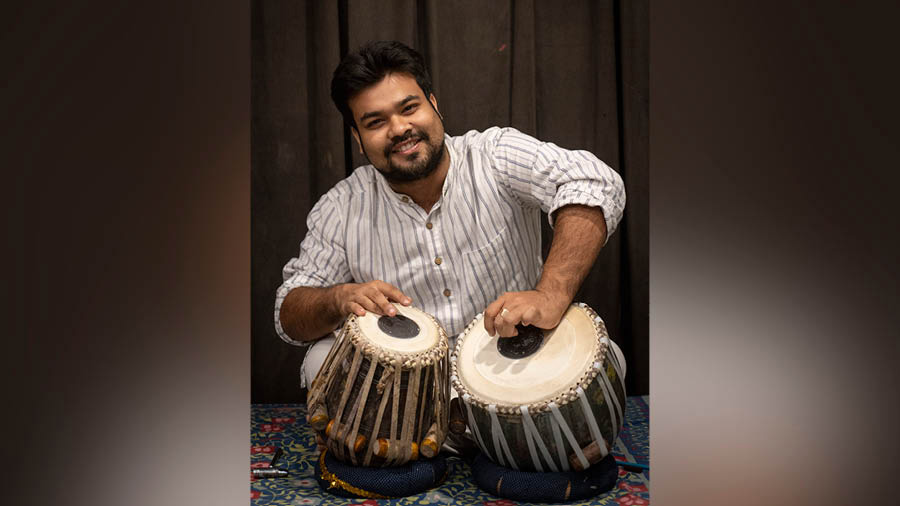
Sen on the tabla
Though Sen’s passion for music has never showed signs of ebbing, his academic interests have also opened other doors. After getting his Bachelor’s degree in Architecture from the OmDayal College of Architecture, he pursued a Master’s in Heritage Management at Ahmedabad University. Sen, a cyclist by choice, had always been careful about his carbon footprint, but it was in Ahmedabad that his awareness grew. The subject of his Master’s thesis — how can traditional craftsmen from Chitpur contribute to disaster risk reduction practices — made Sen see “that heritage conservation is a low carbon-emitting process”. His study of disaster management soon broadened his perspectives about climate change.
How to tame sound
Ever since climate change became Sen’s core area of interest, he has tried hard to approach the subject with nuance. He, for instance, thinks that the goal of ‘net zero emission’ is an impossible one: “Some carbon footprint will be present in whatever you wear and do.”
In 2018, while still completing his Master’s, Sen had joined the Living Waters Museum as an intern. Here he began understanding the concept of ‘water footprint’. “When I learnt that a pair of jeans has a water footprint of 8,000 litres, I was really bothered,” he says. Soon, Sen decided to spread awareness through art, by blending his activism and his love for music. “I told the director of the museum, Sara Ahmed, that I wanted to combine water and music in some way. She was very supportive.” Sen remembers conceptualising his first project while filling a water bottle: “Having noted a change in sound, I decided to put different objects — glasses, bells — inside a pot of water and play music with it. The sound changed with every object, and I used this to depict how the Earth was reacting to climate change.”
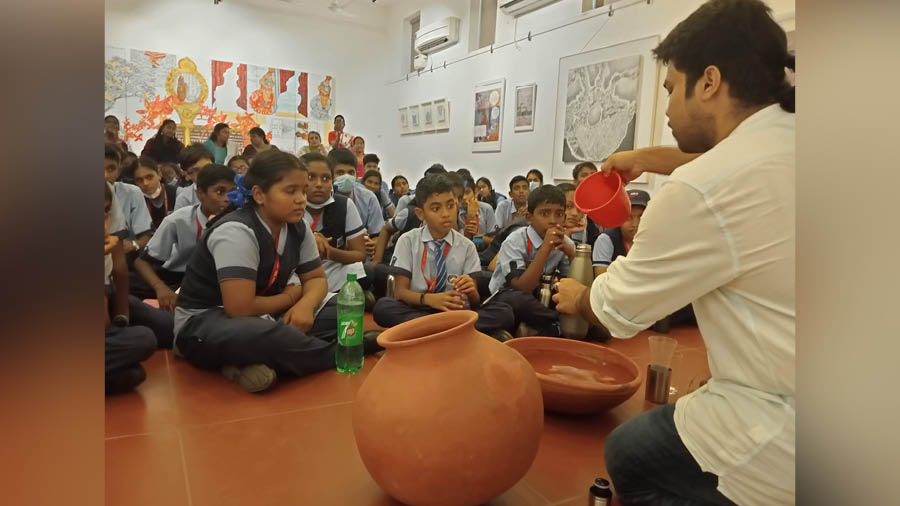
Sen at a workshop with school kids in Chennai
One of Sen’s research ideas, for instance, explores how water propagates sound waves. “I was fascinated by how while talking, sound waves travel freely through the air, but that the sound itself changes if it travels through water. This is what made me make music by playing water itself. I would strike things in air and then in water to observe the change in sound.”
The waves of change
As Sen now leads the Kolkata chapter of the Living Waters Museum, he tries to instil in the youth of the city the values of climate action through art. “I constantly try to explore how we can use the performing arts, traditional knowledge and intangible heritage not only as a medium, but also as a way forward for disaster risk reduction.” Sen’s research also takes as its focus different water songs that exist: the Bhatiali songs of Bengal, songs about waterfalls that are sung in hilly regions, folk songs about monsoon, and the water protest songs of the Narmada Bachao Andolan. “‘Ma Rewa’ by Indian Ocean is no less than a scientific paper.”
Sen has also done some research of instruments that were once water-carrying utensils, like the ghatam and maan. “These were originally used to carry water, but have long been used by communities as percussion to make music. I've been doing workshops about this with children in different parts of the country and even in the US. It is fascinating how by singing about water, the Bhatialis talked about issues like climate change long before scientific officials in big conferences. I want to look at how these folk artists were inspired by nature to create music.”
Sen remembers once introducing the concepts of water and carbon footprints to urban students. Today’s school-going children, he found, still think of climate change as an “elite” idea. “It isn’t democratic yet. Many people don’t connect with it because they are not directly affected by it. We did a project in the Sunderbans with rural and urban children, for example. That was a very different experience. My mission is to reduce this gap,” says Sen.
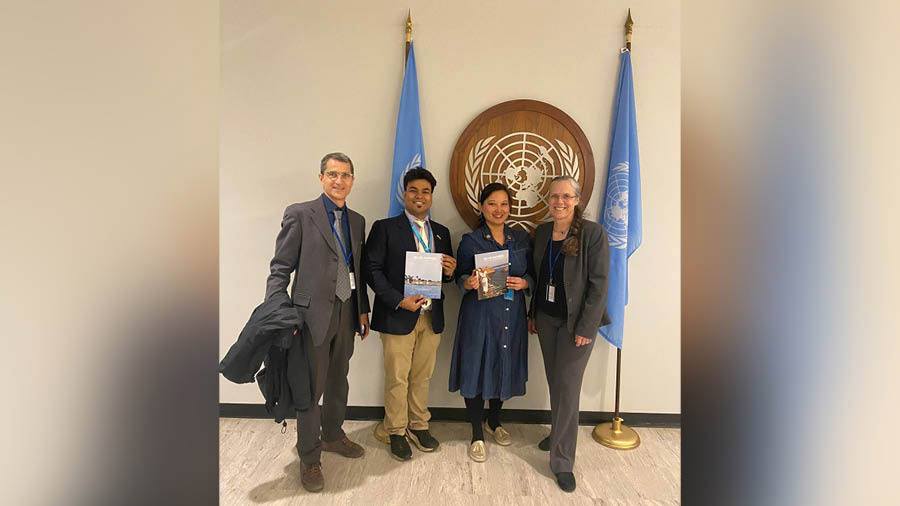
Sen with other delegates at the UN Water Conference
In his efforts to spread awareness about climate change, Sen, for his part, tries to rely on joy more than fear. Children, he says, don’t deserve to be told that they have been born into an irredeemably polluted world. “We need to help them see how beautiful nature is, and that we still have enough to cherish. Nature shouldn’t have to be protected because it's in danger. It should be protected because it is beautiful.” Sen, for instance, will never ask you to stop wearing jeans or living life to fullest. “I am just asking you to be aware of the consequences of your actions, so that you can consume only that which you need.”
With Kolkata in his heart
From March 22 to 24 this year, Sen attended the United Nations Water Conference at the UN Headquarters in New York. In multiple panels, he discussed with government officials and NGOs the importance of youth participation in global water action. “My main focus was to look at how all the arts can be used to spread this message, the visual and performing arts. I also wanted to say that artists are not just entertainers. Like the scientific community, they must also be given a platform to talk about serious issues. We, too, have things to say!”
Sen might well be travelling the world, but he hasn’t lost his granular perspective. His focus remains developing awareness around the importance of water in Kolkata, his hometown. “I am working with my Living Waters Museum team to create an online exhibition on the waters of Kolkata,” he says. "We will bring in researchers and students to talk about various aspects of Kolkata’s waters, its fountains, rivers, ponds, tanks and drainage. We hope to inaugurate it this June.”
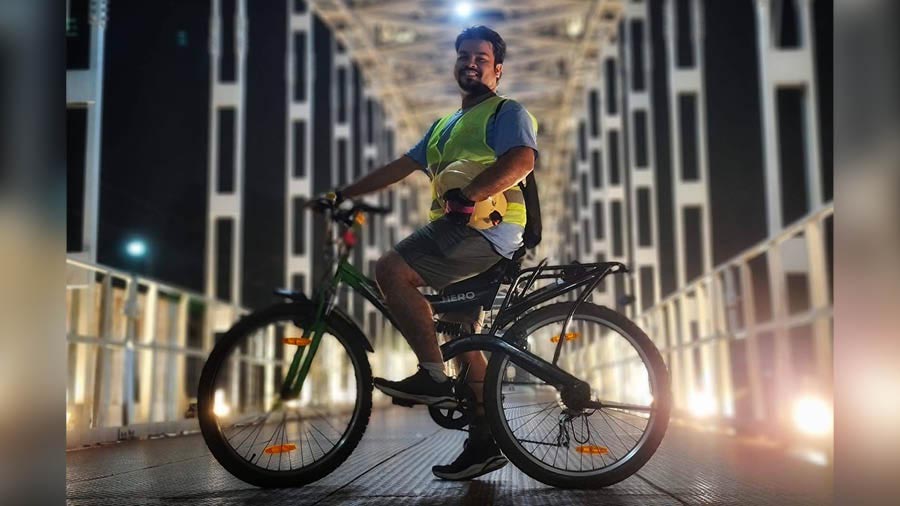
During the lockdown, Sen would cycle to to deliver essentials to senior citizens with other cycling enthusiasts
Sen’s love for Kolkata has roots that run deep. In 2014, after he’d had a disagreement with his parents about driving his father’s car, he bought himself a scooter. Sadly, on the very first day, he broke his leg in an accident. “That prompted me to buy a cycle. I realised how great it was. I could park anywhere and commute for cheap. I would go to the municipal corporation office for work and park my cycle right next to the mayor’s car! It helped me discover the city.”
During the lockdown, Sen would cycle to the Maidan alone at night, but he soon started delivering essentials to senior citizens with other cycling enthusiasts. “Even now, we go exploring Kolkata’s heritage.” Not all of Sen’s cycling, however, has been smooth. It has also made him suffer the city’s classism. “I have been denied entry into five-star hotels because my cycle had me mistaken for a delivery boy. I was supposed to speak at an event once, and the hotel asked me to use the back entrance, just because I was on a cycle. We really need to promote a cycling culture for our society,” he says with his trademark passion.
